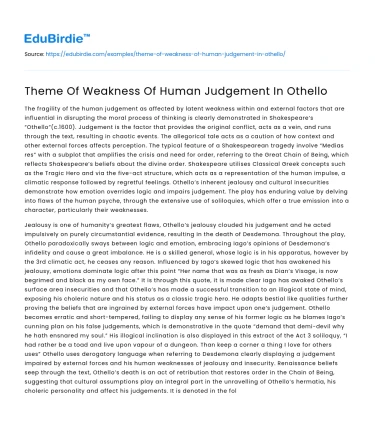The fragility of the human judgement as affected by latent weakness within and external factors that are influential in disrupting the moral process of thinking is clearly demonstrated in Shakespeare’s “Othello”(c.1600). Judgement is the factor that provides the original conflict, acts as a vein, and runs through the text, resulting in chaotic events. The allegorical tale acts as a caution of how context and other external forces affects perception. The typical feature of a Shakespearean tragedy involve “Medias res” with a subplot that amplifies the crisis and need for order, referring to the Great Chain of Being, which reflects Shakespeare’s beliefs about the divine order. Shakespeare utilises Classical Greek concepts such as the Tragic Hero and via the five-act structure, which acts as a representation of the human impulse, a climatic response followed by regretful feelings. Othello’s inherent jealousy and cultural insecurities demonstrate how emotion overrides logic and impairs judgement. The play has enduring value by delving into flaws of the human psyche, through the extensive use of soliloquies, which offer a true emission into a character, particularly their weaknesses.
Jealousy is one of humanity’s greatest flaws, Othello’s jealousy clouded his judgement and he acted impulsively on purely circumstantial evidence, resulting in the death of Desdemona. Throughout the play, Othello paradoxically sways between logic and emotion, embracing Iago’s opinions of Desdemona’s infidelity and cause a great imbalance. He is a skilled general, whose logic is in his apparatus, however by the 3rd climatic act, he ceases any reason. Influenced by Iago’s skewed logic that has awakened his jealousy, emotions dominate logic after this point “Her name that was as fresh as Dian’s Visage, is now begrimed and black as my own face.” It is through this quote, it is made clear Iago has awaked Othello’s surface area insecurities and that Othello’s has made a successful transition to an illogical state of mind, exposing his choleric nature and his status as a classic tragic hero. He adapts bestial like qualities further proving the beliefs that are ingrained by external forces have impact upon one’s judgement. Othello becomes erratic and short-tempered, failing to display any sense of his former logic as he blames Iago’s cunning plan on his false judgements, which is demonstrative in the quote “demand that demi-devil why he hath ensnared my soul.” His illogical inclination is also displayed in this extract of the Act 3 soliloquy, “I had rather be a toad and live upon vapour of a dungeon. Than keep a corner a thing I love for others uses” Othello uses derogatory language when referring to Desdemona clearly displaying a judgement impaired by external forces and his human weaknesses of jealousy and insecurity. Renaissance beliefs seep through the text, Othello’s death is an act of retribution that restores order in the Chain of Being, suggesting that cultural assumptions play an integral part in the unravelling of Othello’s hermatia, his choleric personality and affect his judgements. It is denoted in the following quote from Act 5 'I kissed thee ere I killed thee, no way but this, Killing myself, to die upon a kiss.' Othello speaks poetically about his relationship with Desdemona, his speech returning to the calm rationality back in Act I, linking back to the significance of the five-act structure, symbolizing the flawed human psyche and its ability to make recurring mistake.
Save your time!
We can take care of your essay
- Proper editing and formatting
- Free revision, title page, and bibliography
- Flexible prices and money-back guarantee
The flawed mind is prone to deception and treachery as demonstrated through the characterisation of the Machiavellian Iago. He is ironic in the honesty he displays in his words, as “I am not what I am.” This statement successfully establishes Iago’s duplicitous nature, how he appears throughout the play differs from his motives and inner beliefs and is a biblical allusion, reminiscent of Elizabethan religious status. As Iago makes insinuations about Desdemona’s adultery and Othello pressures him to reveal what he knows, Iago warns Othello against succumbing to jealousy in the following prophetic statement: Oh, beware, my lord, of jealousy! It is the green-eyed monster which doth mock. The meat it feeds on. Iago knows that by stating the word jealousy and associating it with an offensive personified visual image will increase Othello’s concern. Iago’s use of the colour green stems from a Renaissance belief that green was a “bilious hue,” linked to an imbalance of the humours that caused one to be prone to fear and jealousy. Iago guiltlessly plays with meaningful things i.e. the recurring motif of Desdemona’s handkerchief is emblematic of how emotion affects Othello’s perception of his wife, going to brutal measures to achieve a totalitarian society, reflecting the turbulence and uncertainty of the time. “Men should be what they seem, or those that be not, would they might seem none!” this irony in this quote further cements Iago’s deceptive nature and the characteristics that make up such a formidable character develop the main themes of the play.
Shakespeare’s Othello is an expertly crafted allegory that reaffirms the idea that even the greatest men have latent weaknesses within them. Shakespeare’s use of biblical allusions add depth to characters of Iago and Othello, without sacrificing the lengthy character development that drives the play. The evidence suggests overwhelmingly that the play proves the flaw of human judgement; however as proven, external forces also have ability to cloud judgement. An examination of the relationship between Iago and Emilia would have added an interesting dimension to this; however, time constraints inhibit a full consideration. Othello encapsulates universal concerns of human judgement, which is exemplified in the tragic judgement Othello makes of Desdemona “she’s like a liar gone to burning hell!”






 Stuck on your essay?
Stuck on your essay?

